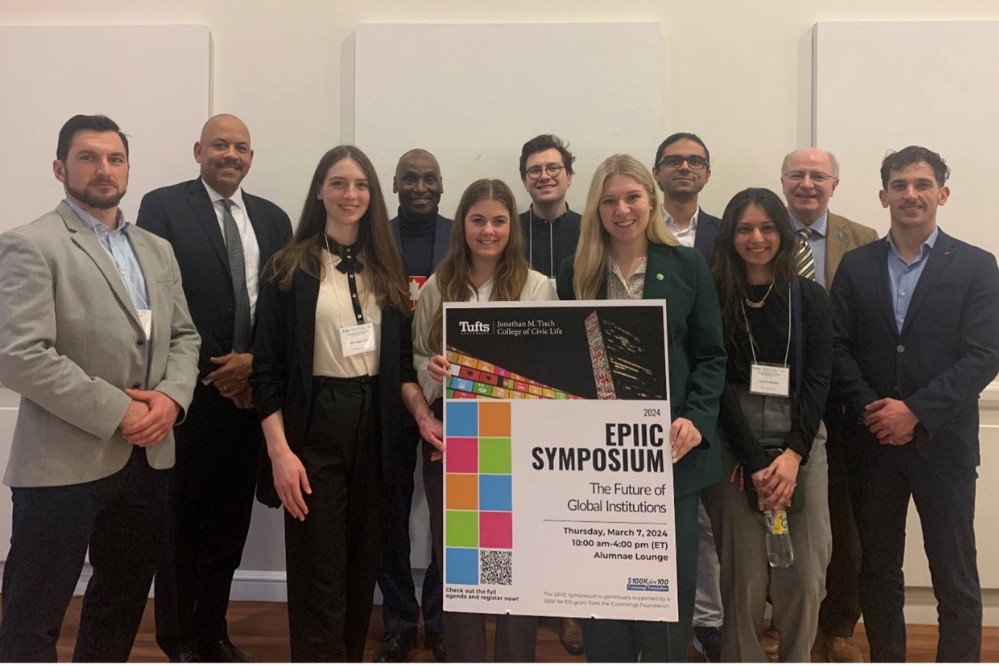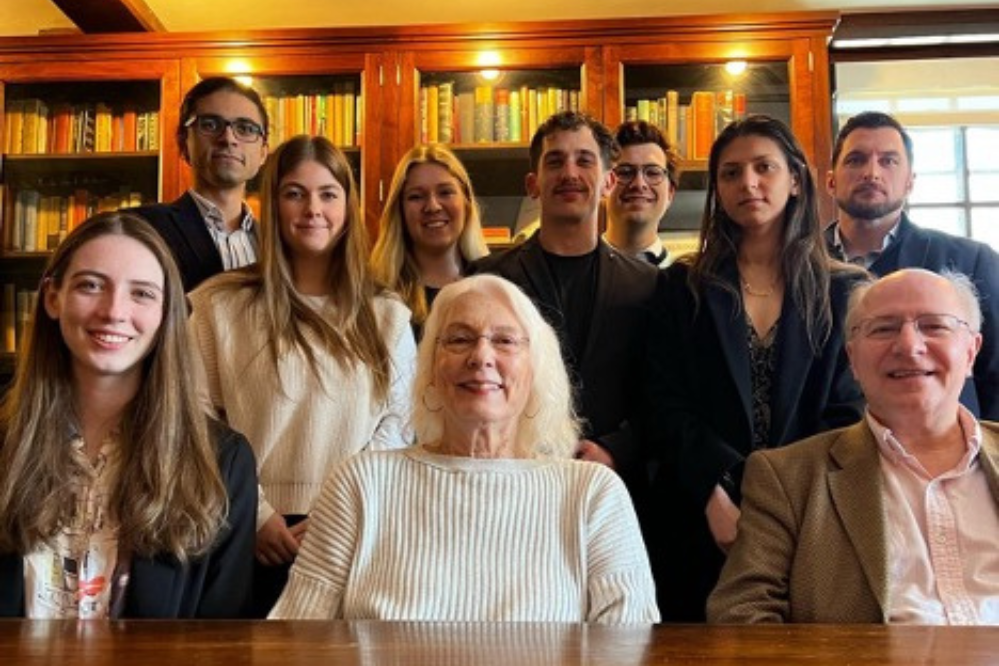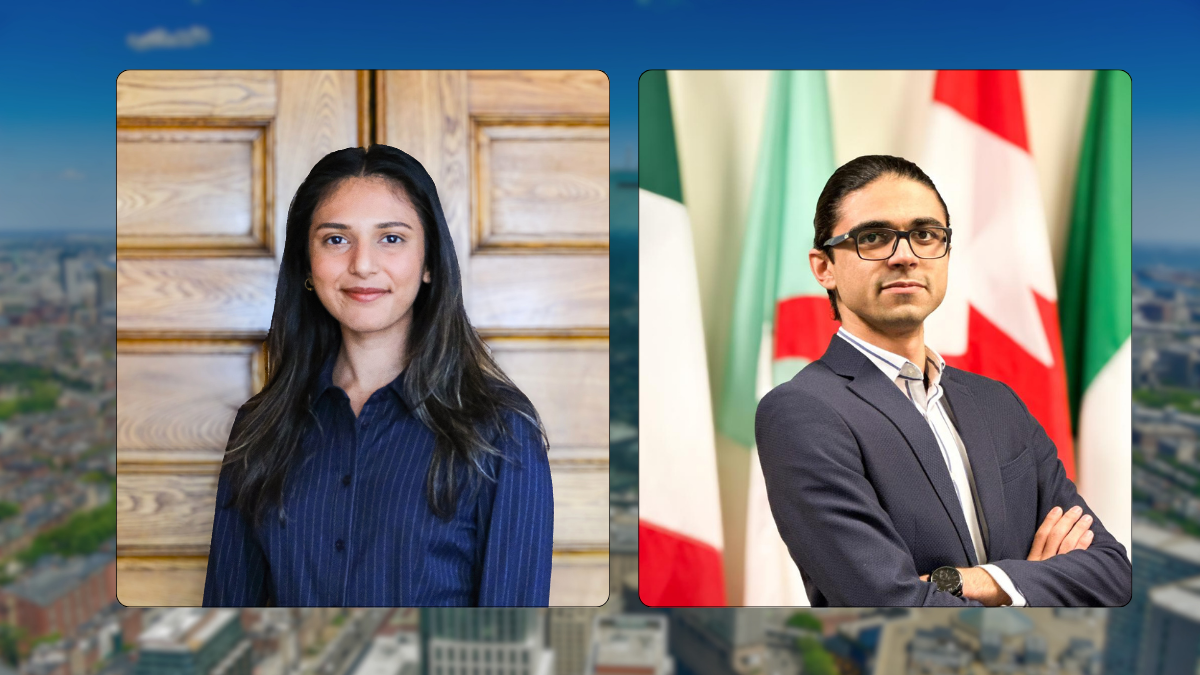Over our mid-term reading week in March 2024, a group of students from the International Peace Mediation (IPM) course (CML4113), originated and taught by Professor John Packer, enjoyed a fieldtrip to Boston to participate in an international symposium grappling with the challenges and prospects of global institutions. This followed our intensive January Term course and exposed us to various actors and views as we reflected together on the tumultuous times and uncertainty. Specifically, the fieldtrip invited us to consider how law and mediation can support effective peace-making and peace-building initiatives at a time when we need them more than ever before.
The IPM course integrates various fields and introduces key concepts, frameworks, institutions, and recurrent issues, along with a variety of challenges encountered by a range of actors involved in peace-making and peace-building today. It allows us to engage with the substantive issues and evolving body of norms and practices relating to conflicts and kinds of intervention, enabling us to explore current conflict scenarios and mediation initiatives. It also includes key skills development.
While the study of international peace-making is a relatively recent subject, as more practitioners, scholars and students enter the field, our collective capacity is improving to analyze and assess peace processes critically and, we hope, to contribute positively to them.
From 6 to 9 March 2024, we attended the Fletcher School at Tufts University in Medford, Massachusetts, to participate in the EPIIC (Education for Public Inquiry and International Citizenship) annual International Symposium, this year contemplating “The Future of Global Institutions”. The program treated the future of international organizations, UN peace operations, international mediation, US-UN relations, and global health. Although the Symposium itself was one day, we had the chance to meet and engage with students and participants from different corners of the world, including South America and the Middle East, before and after the formal program.
We especially enjoyed organised and informal exchanges with the Brazilian delegation. This opportunity allowed us to listen, learn and debate how students from different countries approach various topics concerning international affairs. From the systemic issues that present challenges to a sustainable future in Brazil, it was clear that Canada faces many of the same challenges, if in different measures. Though we talked about these similar challenges, we did so in quite different ways. This opened our minds to new perspectives – inviting us to reflect upon our own assumptions, approaches and possibilities.
For example, the Brazilian students – from various fields of study – made it clear that they came to the EPIIC Symposium as advocates for social justice. Their insights and perspectives on international issues, especially human rights, made them unafraid to voice their opinions which often focused on the impact violations have on those directly affected (and typically less powerful).
By invoking the framework of “diversity, equity, and inclusion”, they asserted that, within the conversations that have the power to change socio-political environments, we must not simply “include” those who are systemically harmed. Rather, we must “turn the table,” and allow those harmed to lead the conversations. Thus, they linked identified grievances to a process for their resolution.
The approach taken by the Brazilian students on socio-political issues was unfamiliar. As Canadian law students, we are often taught to approach topics through neutral, legal frameworks – to separate “political” issues. This can cause us to over-complexify topics, which, in turn, constrains us in making conclusive decisions on important issues and can cause us to become distant from humanitarian values and risk forgetting the lived experiences of victims. The Brazilian students appeared more confident as their sincere, authentic voices and insights furthered our understanding of how international peace mediation may be more sensitive – helping us to see how we can become more effective practitioners.
The EPIIC Symposium took place on 7 March and was organized by Dr Abi Williams (former Senior Adviser to UN Secretary-General Kofi Annan, and author of a new book on his experience). The Symposium had multiple panels stretching throughout the day. Speakers included a former President of Costa Rica, current officials from the UN, former Ambassadors to the UN, and scholars from different countries (including Professor Packer from uOttawa Law). A rich and stimulating program, the speakers touched upon a variety of challenges, such as institutional paralysis, climate change, the authoritarian wave across the world, and rising inequality between and within States.

At the end of the day, deep and meaningful conversations were facilitated during the “Black Family dinner”, which brought together students and faculty from Tufts University, Harvard Law School, and the international visitors. We had respectful conversations about pressing issues and global struggles such as on decolonialization, various armed conflicts and climate change. Speaking openly with highly informed and thoughtful people of varying perspectives allowed us to profit from the rich exchange while enjoying a great meal together.
The EPIIC Symposium underscored the importance of international organizations in managing and mitigating conflicts in our increasingly interconnected and interdependent world. The conference served as a powerful reminder of the urgent need for collaboration and diplomacy to address global issues effectively and in a timely manner.
A special part of the fieldtrip was tailored for us as Professor Packer had arranged a series of smaller group meetings on 8 March. We were privileged to learn from renowned experts: Professor of Practice in International Conflict Management Dr. Eileen Babbittt and Professor of the Practice in International Negotiation and Conflict Resolution Diana Chigas as well as Tim Phillips (founder of Beyond Conflict). In intimate settings, we were introduced to cutting-edge scientific analysis of cognitive behaviorism and neurological research relating to conflict as well as social-psychological challenges like “meta-dehumanization” (the perception that someone else sees you or your community as less than human), and we learned about contemporary challenges like corruption and the deep roots of intractable conflicts as well as strategies to work towards effective peace mediation. These smaller gatherings were particularly thought-provoking as they allowed us to directly pose questions and expand our views guided by world-leading experts.

Reflecting on entering Law School – when we heard a lot about OCIs and imagined the world as “big law” – we came to understand the wider opportunities open to us. The fieldtrip accompanying Professor Packer was an eye-opening experience where we could begin to grasp just how opaque the “hidden job market” can be, and how broad a JD really is in equipping us for the world. It was a perspective altering experience – discussing ideas with global consequences, meeting thought-leaders, various professionals and, of course, other students. In addition, as classmates we bonded and made connections which will last well beyond law school. As individuals, it was both humbling and encouraging to not only be in the room where important conversations were taking place, but to realize that we belonged in the room.
This fieldtrip certainly pushed us to think outside of the box, while serving as a platform that allowed us to explore future opportunities, as it exposed us to career options we had never considered before. We also enjoyed valuable time as classmates – including a stroll around Harvard University, dinner in Cambridge, and an unplanned walk through the impressive Harvard Law School Library. We left Boston with a vivid grasp of the practical difficulties and complexities faced by mediators and other practitioners after hearing stories and experiences from different regions of the world.
The week was filled with conversations over meals, exploring a new city, gaining perspective and learning about the many paths that can be taken with a law degree. Being able to learn and engage with a professor outside of the classroom and build relationships with similar-minded peers was a highlight of our law school experience.
On behalf of our class, we thank Professor John Packer and the Edith Neuberger (’81) and Norm Jesin (’81) Professorship for this memorable hands-on learning experience which left us enriched and inspired.
Contributions to the article were received from class-mates Mallory Gitzel, JD '24, Robin Marie Kelly, JD/MA '24, Alex Metaxas, JD '24 and Alper Yilmaz (3L).
